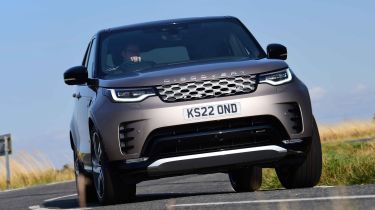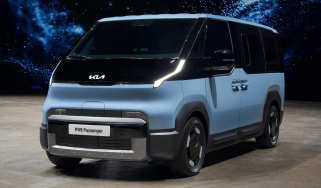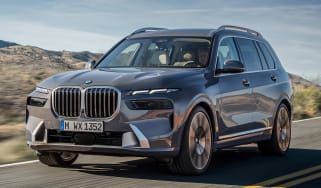Land Rover Discovery - Engines, performance and drive
The six-cylinder petrol and diesel engines in the Land Rover Discovery offer plenty of pace and performance

With air suspension as standard, the Land Rover Discovery generally rides smoothly over most surfaces. It’s most comfortable on smaller wheels (now 20-inch as standard on S, with 19-inch alternatives as an option), because the larger 21 and 22-inch alloys do cause some harsher jolts from the rear axle over more severe bumps, but that’s not too much of a surprise given that the Discovery has been designed to carry seven people and luggage.
The Discovery’s weight (this is still a two-tonne-plus car despite the savings) and long-travel suspension designed to keep the wheels in contact with the ground as much as possible when off-roading, means there’s plenty of body movement. Thankfully, the damping has been tuned so that you end up with motions that are gentle and languid, which can be quite cosseting for passengers.
The steering is slow for off-roading purposes, and isn’t as precise as more road-biassed SUVs like the BMW X5, so the Discovery isn’t a particularly agile car to drive. There’s lots of body roll in faster corners, but it leans over in a predictable manner, so you quickly get used to it and learn to drive in a relaxed and smooth manner. The refined powertrains help, too – we'd argue that comfort and quietness are the most important traits in a car like this that’s more than likely going to be filled with children, or possibly a couple of dogs.
Used - available now

2018 Land Rover
Discovery
46,144 milesAutomaticDiesel3.0L
Cash £28,995
2023 Land Rover
Discovery
38,561 milesAutomaticDiesel3.0L
Cash £43,995
2019 Land Rover
Discovery
21,092 milesAutomaticDiesel3.0L
Cash £39,295
2023 Land Rover
Discovery
25,537 milesAutomaticDiesel3.0L
Cash £43,800All cars feature an eight-speed automatic gearbox and permanent four-wheel drive, and all models come with Land Rover’s Terrain Response set-up. It can be set to an ‘Auto’ mode so that it’ll automatically sense what surface the car is driving on, and adjust the parameters of the engine, transmission, and traction control system across five different driving modes to suit different types of terrain.
If you regularly have to tow a horsebox or caravan out of a muddy field or happen to regularly go off-road, you may want to consider the Advanced Off-Road Capability pack, because that adds a more advanced Terrain Response II system, along with other mechanical goodies such as low-range gears and a locking rear differential, both designed to better control of the power going to the wheels in order to provide better traction in slippery conditions.
So despite the softened styling and all the refinement of the Discovery, it’s still unrivalled when it comes to off-road performance. Indeed, all this technology only adds to the easy, relaxed and unhurried nature with which the Discovery goes about its business, helping to make this easily one of the most comfortable and practical cars on sale today.
However, the Discovery's incredible size means it can be a little more challenging to thread down a narrow country road, as well as to park (although there are plenty of features to help you with the latter). Similarly, car's the weight means you need to get your braking done nice and early, but the car still feels safe and reassured, with more than enough stopping power.
Engines, 0-60 acceleration and top speed
As part of the 2020 facelift, Land Rover introduced an entirely new range of six-cylinder engines for the Discovery, which benefit from 48-volt mild-hybrid assistance as standard.
This technology provides a tiny bit of electrical assistance to the engine when setting off or acceleration, but not so much that you’d notice, and certainly not to the extent that it can motivate the Discovery under electric power alone, like plug-in hybrid rivals such as the Audi Q7 50 TFSIe, BMW X5 xDrive50e, Volvo XC90 Recharge.
The P360 petrol version takes the title for best performer in the Discovery range. Its 3.0-litre straight six unit produces 355bhp and manages the 0-62mph sprint in 6.5 seconds, before topping out at a 130mph maximum.
The least potent engine is the 247bhp D250, but it can still hold its head high with a decent 8.1 second time and 120mph top speed. The more powerful D300 diesel splits the difference in terms of pace, with a 6.8-second dash to 62mph and a top speed of 130mph. Neither diesel is quite as powerful as the X5 equivalent, though.









